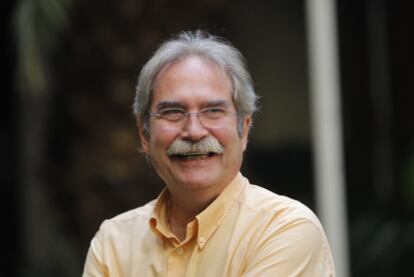Catalonia's great European novel
A 1,000-page story tracking 600 years of Western evil, 'Yo confieso' (I confess), is Catalan author Jaume Cabré's most ambitious book to date
A boy wearing short pants and a burgundy vest over a white shirt, hair parted to one side, stands on tiptoes to grab a book from a hard-to-reach shelf in his father's library. We're in the 1950s. The child's name is Adrià Ardèvol and he is the curious protagonist of Yo confieso (or, I confess), the latest novel by Jaume Cabré. The work, which is over 1,000 pages long, was introduced as "a great European novel" that tracks down the presence of evil in the Western world over the last 600 years.
Cabré's new book had been eagerly awaited since the great international success of Les veus del Pamano , which sold 450,000 copies in its German translation alone. As though to underscore that the release of Yo confieso is destined to mark a watershed in Catalan literature, the book presentation at Barcelona's Ateneo was packed to the rafters.
Besides other novels in Catalan such as Fray Junoy o l'agonía dels sons, Senyoria and L'ombra de l'eunuc (all of which have been translated into Spanish), Cabré has also written short stories, plays, essays and scripts for television and film. In 2010 he was awarded the Prize of Honor of Catalan Letters, the top literary accolade for a writer in the Catalan language.
Josep Lluch, the head of Proa, which is publishing Yo confieso , defined it as "a novel of novels that do not work as a chain but advance together like a single story." Cabré, said Lluch, "is a top-level European author" working in the same register as Dostoyevsky or Proust. In any case, it is true that some literary critics are already calling it "the great central novel" of Catalan literature, and comparing it to Thomas Mann's The Magic Mountain , in that it does for Catalan literature what Mann's novel did for German-language literature.
Yo confieso - which, as Cabré admits, to some extent makes reference to Emile Zola's famous "J'accuse" - is the confession of an only child who is gifted but deprived of a loving environment. Born into a family of the Catalan haute bourgeoisie in the late 1940s, he has a dark past to hide and is trying to find explanations for the existence of evil. It is a Faustian story about the permanent presence of evil beyond the particular person who embodies it at any one time, from a Catalan inquisitor in the 15th century to a doctor at Auschwitz. The story masterfully reviews the history of the West and grows in scope through countless characters, so much so that the author was forced to include a list of dramatis personae to guide bemused readers.
The novel is also the story of a violin, a Storioni from Cremona - Cabré is an inveterate music lover - and about a musician named Bernat Plensa, who is Adrià Ardèvol's soulmate. What's more, it paints a portrait of an obsessive collector. Above all, though, Yo confieso is a novel about evil.
Cabré began writing it nearly eight years ago without any clearly defined ideas, simply letting the story take shape by itself. Writing, he admitted, is his greatest pleasure. "I just can't stop doing it."








































